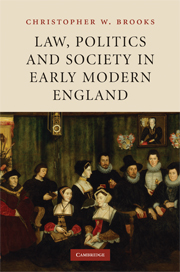Book contents
- Frontmatter
- Contents
- Preface
- Abbreviations and conventions
- 1 English history and the history of English law 1485–1642
- 2 Courts, lawyers and legal thought under the early Tudors
- 3 The initiatives of the crown and the break from Rome
- 4 Political realities and legal discourse in the later sixteenth century
- 5 The politics of jurisdiction I: the liberty of the subject and the ecclesiastical polity 1560 – c. 1610
- 6 The politics of jurisdiction II: multiple kingdoms and questions about royal authority
- 7 The absoluta potestas of a sovereign and the liberty of the subject: law and political controversy in the 1620s
- 8 The degeneration of civil society into a state of war 1629–1642
- 9 Law and ‘community’
- 10 The aristocracy, the gentry and the rule of law
- 11 Economic and tenurial relationships
- 12 The household and its members
- 13 The person, the community and the state
- 14 Conclusion
- Manuscript bibliography
- Index
- References
4 - Political realities and legal discourse in the later sixteenth century
Published online by Cambridge University Press: 06 July 2010
- Frontmatter
- Contents
- Preface
- Abbreviations and conventions
- 1 English history and the history of English law 1485–1642
- 2 Courts, lawyers and legal thought under the early Tudors
- 3 The initiatives of the crown and the break from Rome
- 4 Political realities and legal discourse in the later sixteenth century
- 5 The politics of jurisdiction I: the liberty of the subject and the ecclesiastical polity 1560 – c. 1610
- 6 The politics of jurisdiction II: multiple kingdoms and questions about royal authority
- 7 The absoluta potestas of a sovereign and the liberty of the subject: law and political controversy in the 1620s
- 8 The degeneration of civil society into a state of war 1629–1642
- 9 Law and ‘community’
- 10 The aristocracy, the gentry and the rule of law
- 11 Economic and tenurial relationships
- 12 The household and its members
- 13 The person, the community and the state
- 14 Conclusion
- Manuscript bibliography
- Index
- References
Summary
Mid-Tudor turmoil
The immediate impact of the Henrician regime on political ideas and political discourse engaged in by lawyers was less than clear-cut. Lawyers were sometimes bullied by Henry VIII, but the more important point is that legal institutions, including the inns of court, survived largely unscathed, and on some important secular issues, such as uses and wills, the profession contributed to political compromise. Henry VIII may personally have believed that the king ruled under God rather than under the law, and, as we have seen, some legal rhetoric communicated to the public appears to have endorsed such a view. Nevertheless, there is considerable truth in the contention that Henrician political thought contained unresolved tensions between ascending and descending theories of where ultimate political authority lay, and there was much that blurred the distinctions. The break from Rome, the dissolution of the monasteries, and the subsequent changes in the church were all carried out through parliament. Indeed, in the 1540s Henry even went so far as to encourage parliament to pass a statute that enabled him to determine the succession to the throne by will so that he could ensure that his son Edward would succeed in preference to his eldest surviving child, Mary, daughter of Catherine of Aragon.
Despite all of his efforts, however, Henry was ultimately unable to completely resolve the problem that had launched his ‘empire’ in the first place, the succession to the throne.
- Type
- Chapter
- Information
- Law, Politics and Society in Early Modern England , pp. 51 - 92Publisher: Cambridge University PressPrint publication year: 2009

